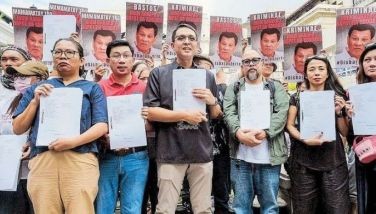SWS: Women make better peacemakers
March 5, 2005 | 12:00am
Women may make a difference in peace negotiations with Muslim militants and communist rebels, according to the results of a survey released yesterday by the Social Weather Stations (SWS).
In the survey conducted last year, 58 percent of the 1,440 respondents from all over the country agreed that "a woman has more talent than a man to find a way to settle a conflict without resorting to violence."
The survey, conducted from Oct. 19 to Nov. 2 last year, was commissioned by the Mindanao Commission on Women and sponsored by the Australian Agency for International Development through the Philippines-Australia Governance Facility. It has an error margin of three percent.
The National Capital Region (NCR) had the highest percentage of respondents who believe women have more talent at being peacemakers (66 percent), followed by the rest of Luzon (63 percent). Just over half (51 percent) of respondents in the Visayas agree, compared to 48 percent of respondents in Mindanao.
More female respondents all over the country agreed with the statement (59 percent) compared to male respondents (56 percent), but this was not the case in Mindanao. Only 48 percent of both male and female respondents there agreed that women have more talent at being peacemakers.
The survey also found that 66 percent of Filipinos agree that "a successful peace process in Mindanao needs as much participation from women as from men," with 15 percent undecided and another 15 percent disagreeing with the statement.
Support for women’s participation in the peace process is strongest in most of Luzon (70 percent), followed by the NCR (67 percent), Mindanao (63 percent) and the Visayas (61 percent).
The survey also found that 71 percent of respondents from the ABC economic classes support women’s participation in the peace process, compared to those in class E (66 percent) and class D (65 percent).
Three out of five Filipinos (62 percent) agree that women must be represented in the government panel negotiating peace with the Moro Islamic Liberation Front (MILF), according to the survey.
Support for women in the peace panel was actually stronger in the NCR and most of Luzon (both at 66 percent), than in the Visayas (60 percent) and Mindanao (57 percent).
All over the country, female respondents, at 63 percent, led male respondents by one percentage point in supporting the participation of women in the peace panel. However, male and female respondents in Mindanao showed less support at 56 percent and 58 percent, respectively.
Filipinos are divided on whether "women are more effective than men in preventing conflict," with 38 percent agreeing, 21 percent undecided, and 38 percent disagreeing with the statement.
Government peace panels have two women on board. Sylvia Paraguya was made a member of the panel negotiating peace with the MILF, while Nieves Confesor was recently named chairwoman of the panel conducting peace talks with the Communist Party of the Philippines.
In the survey conducted last year, 58 percent of the 1,440 respondents from all over the country agreed that "a woman has more talent than a man to find a way to settle a conflict without resorting to violence."
The survey, conducted from Oct. 19 to Nov. 2 last year, was commissioned by the Mindanao Commission on Women and sponsored by the Australian Agency for International Development through the Philippines-Australia Governance Facility. It has an error margin of three percent.
The National Capital Region (NCR) had the highest percentage of respondents who believe women have more talent at being peacemakers (66 percent), followed by the rest of Luzon (63 percent). Just over half (51 percent) of respondents in the Visayas agree, compared to 48 percent of respondents in Mindanao.
More female respondents all over the country agreed with the statement (59 percent) compared to male respondents (56 percent), but this was not the case in Mindanao. Only 48 percent of both male and female respondents there agreed that women have more talent at being peacemakers.
The survey also found that 66 percent of Filipinos agree that "a successful peace process in Mindanao needs as much participation from women as from men," with 15 percent undecided and another 15 percent disagreeing with the statement.
Support for women’s participation in the peace process is strongest in most of Luzon (70 percent), followed by the NCR (67 percent), Mindanao (63 percent) and the Visayas (61 percent).
The survey also found that 71 percent of respondents from the ABC economic classes support women’s participation in the peace process, compared to those in class E (66 percent) and class D (65 percent).
Three out of five Filipinos (62 percent) agree that women must be represented in the government panel negotiating peace with the Moro Islamic Liberation Front (MILF), according to the survey.
Support for women in the peace panel was actually stronger in the NCR and most of Luzon (both at 66 percent), than in the Visayas (60 percent) and Mindanao (57 percent).
All over the country, female respondents, at 63 percent, led male respondents by one percentage point in supporting the participation of women in the peace panel. However, male and female respondents in Mindanao showed less support at 56 percent and 58 percent, respectively.
Filipinos are divided on whether "women are more effective than men in preventing conflict," with 38 percent agreeing, 21 percent undecided, and 38 percent disagreeing with the statement.
Government peace panels have two women on board. Sylvia Paraguya was made a member of the panel negotiating peace with the MILF, while Nieves Confesor was recently named chairwoman of the panel conducting peace talks with the Communist Party of the Philippines.
BrandSpace Articles
<
>
- Latest
- Trending
Trending
Latest
Trending
Latest
Recommended

































